New Orleans
Neighborhood Portraits
Broadmoor
"(to come)." (from The New Orleans Data Center)
New Orleans
|
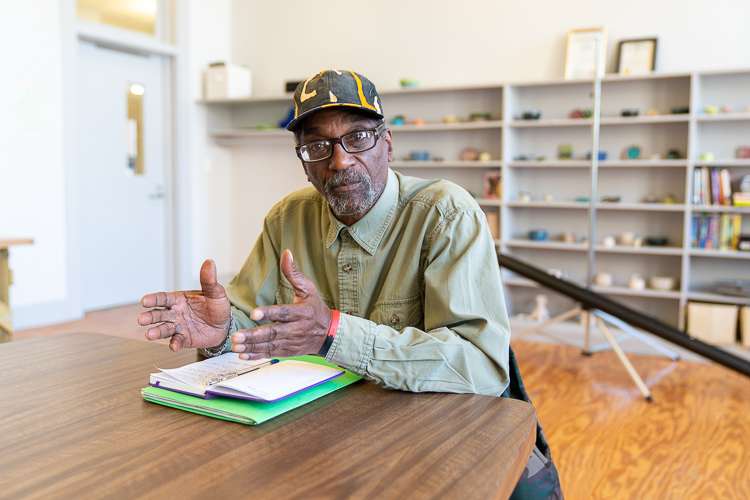
Ernest Johnson, President of the Broadmoor Improvement Association
at the BIA's Arts and Wellness Center
Ernest Johnson: Broadmoor, I'm proud to say is the home of two mayors. Mayor Landrieu lived in Broadmoor, and Mayor Cantrell lives here so we have some political clout here. It's home of a lot of prominent people again, Latoya got her thing here, Mary Carol also achieved a lot of work here in Broadmoor on women's issues, and she works closely with independent women's organization, IWO, they're very active and so we have links to that through some of the community members and people on the board. I have access, I can call people in from the ones we know, the Councilman I knew very well before he was a councilman. So we can get some stuff here done in Broadmoor. So we’re pleased about that. But the struggles like in any community continue with the infrastructure, the homes, I'm seeing some more blighted properties around. I'm starting to ask questions about that. I think there would be an opportunity in the spring for a lot of home vacancies and again, just want to make sure that we don't get outrageous. It's clicking point, the guy that's selling his house for $690, he's been on the market for 271 days. I suspect, you see that sign reduced price. That's an idea of how long it's been there, when you go there and they flipped a little sign, reduced prices, and that gives me a consensus about what's going on. That's still a concern of mine, just the housing and the rental costs, but they seem to have subsided a little bit. Ernest Johnson: Prior to three years ago, I was coming back and forth. Then when I came about three years ago I decided to semi retire and just kind of stayed down here. So we've been renting, that's why we're looking to buy and stay down here. But I'm very familiar with New Orleans, my uncle was a Mardi Gras Indian chief. I'm familiar with the music. I was out right after Mardi Gras behind my cousin going up Washington Avenue and Loyola for little baby a beautiful cosmos. I'm very familiar with New Orleans. I know the Marsalises from Lincoln Center in New York and that whole crew and friends with a lot of the musicians. I knew a lot of New Orleanians when I came down here, roots in the south between New Orleans and Virginia, so those are the two places between my parents and my uncles and relatives. I used to used to travel a lot. Unfortunately, when I came down here, some of the bathrooms in New Orleans were still segregated in the early 60's. I used to visit, and I was a very outspoken young man at that time. So from the age of 16 to about 22, I stayed away. My father's concerned because I didn't understand that distinction, particularly when I had to relieve myself, that made no sense and so my father used to be horrified, because I used to go in spaces that were not reserved for us at the time and for me it was what it was, my father was a little unsettled so for a while I didn't come down. But I'm very familiar with New Orleans, the music, I'm a drummer myself. Q: You’re a drummer? Ernest Johnson: Yeah, so for me with the music, brass hop and all that stuff and Broadmoor I got involved through a workshop, Curtis Doucette, one of our executive committee members, Treasurer, was at one of the workshops we did in undoing racism. He talked about Broadmoor, I didn't know anything about it. So I said how do you get on the board and I thought it's gonna be easy, and I get there and a month later they hand me these petitions, I gotta go around and knock on doors. I'm running for office, can you sign my petition, some people slam their doors. When you're on the board, you have the status of an elected official, you have to deal with conflicts of interest port, you have to be sworn in by a judge, you have to get signatures, there has to be an affidavit certifying that stuff. It's a whole process and so I may be taking it a lot more seriously. I was going to take it seriously but I didn't know what was going to be that intricately involved but it's been a pleasure. Like I said, I love this community; as long as I'm down here my wife and I are going to stay in Broadmoor. I know I'm an uptown kind of guy. I love it uptown. The transportation which I rely on, public transportation, is easily accessible downtown. I can take a 16 bus, I can go right here on Napolean and be downtown in 15 minutes. I can go on a 16 bus on South Claiborne and be in the French Quarter in about 20 minutes. I can go to Canal Street and take the street car, I can go down to Carrollton and go down South Claiborne, I go up South Claiborne even into Jefferson County on the number five bus. It's a major artery for me for public transportation. |
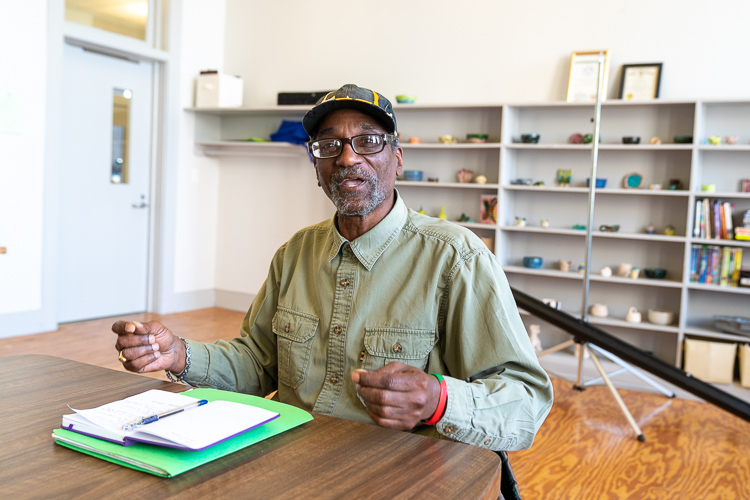
Ernest Johnson: Yeah, I'm glad the residents had the resilience to let Mayor Nagin know it was a good neighborhood, cause this would have been a big giant green dot with a park had it been up to the druthers at that time of the city. So I love Broadmoor for a number of reasons. But what stands out for me is the resilience, people were living at the second floor of their houses and the city again was just going to green dot the whole place, so with our board we have a running joke about green dot, there's a cafe at the library. So green dot interjection comes up a lot. Q: So you still talking about the green dot? Ernest Johnson: We still talk about the green dot because I just came from a house that’s being rehabbed right on my block that was blighted just up until recently over Katrina and so there's three properties that we're rehabbing that's been vacant since Katrina when the damage was done. So we formed a partnership and a member of our board whose strength is real estate is working. And we finally after all the years have gotten the rehabilitation done. So the place that I just came from was 100% different from where it is, and so we're really pleased with that, as well because part of our mission as the Broadmoor Improvement Association is beautification and certainly a house laying dormant for nine years doesn't contribute to beautification, so we're glad to be able to move on and get that big milestone. |

Ernest Johnson, in section B of Broadmoor
Q: Tell a little bit about that house if you would. Why did it stand for so long? Ernest Johnson: It stood for so long because the previous owner moved away and couldn't come back. But yet, like many challenges of many people here today still had mortgages all of their houses were underwater literally and figuratively and they still had to pay that. So a lot of people walked away with the city auctions and stuff like that. The other thing that the community safeguarded against was during Katrina, after Katrina, and people started jacking up the rents considerably and so in terms of the ratio mixture of the community, it changed it a little bit because a lot of the African American residents previously could not eat and even the middle class residents. Broadmoor is a diversity of not only people of ethnically but also economically. You have some sections, Section C is where I am, it is considered affluent and I always tell my wife well if it is I don't know what we're doing here. But nonetheless, it's considered the most affluent. C is because those are all those big houses in Napoleon Avenue. Then you have Subsection B and subsection A, where you have some real challenges there, the houses are not as large, the property, the sale of the houses are not as much. And so it's very diverse economically as well. People are now starting to come back years after Katrina, because financially, some people who want to come back. I know that because I spoke to a lot of people during Mardi Gras, I met a lot of people who came back to that, but who were residents and all of them to a person talked about the difficulty in coming back to the community from Katrina. But all who talked about how they loved uptown, how they love Broadmoor and that kind of thing. So that's again, what I love. It's reflective of the district B. Broadmoor's in district B 40%, white 48% Black 6% others so you have a certain mix and now the demographics I think in Broadmoor is about maybe 55% African American about 42/ 43% White and then the rest are other small categories of other on there. Then two years ago is another challenge because Louisiana and New Orleans rents went up by 6.2%. |
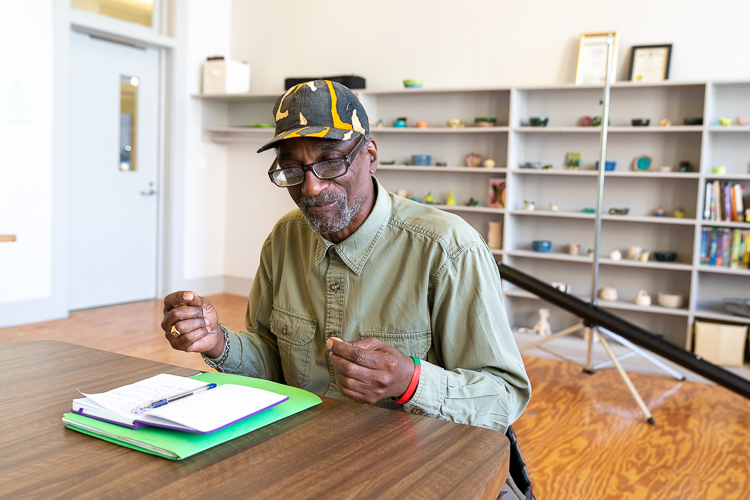
Q: So you mentioned your work a couple times? Ernest Johnson: I'm involved in a couple of coalition's actually and then I left. Another coalition that I'm involved with is a coalition called the ride, it's a coalition for quality transit. I was just in an RTA board talking about the ride to the airport because one of my permanent jobs is Senior Case Manager to New Orleans mission. I do that from eight to one under contract. |
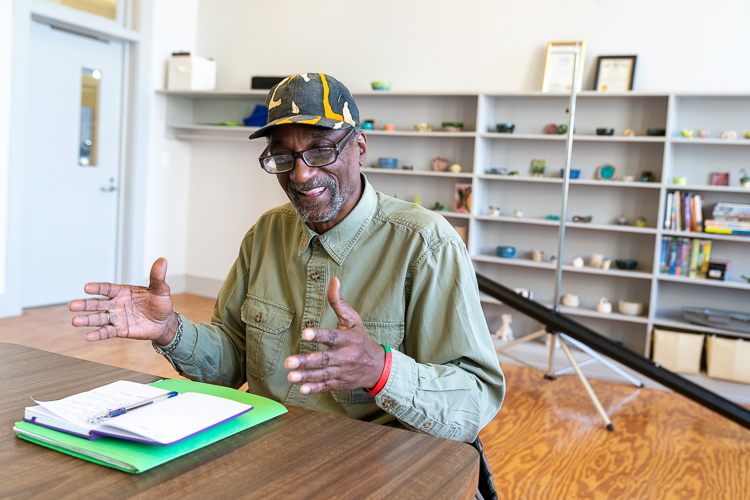
Q: Is it for homeless people? Ernest Johnson: Yes for homeless people, the shelter for men and women's religious base, I do senior case management there. I also do a trainer for an organization called the People's Institute for Survival and Beyond. Every month, twice a month, I go around to different places. Actually, the last two board meetings, I had my deputy chair it because I was doing a workshop, with the first month before that's in Seattle, and one in Virginia. That's about undoing racism, how race is a very speciousclassification. We all knew how bamboozled, race is basically a junk science. It's built on junk. It's a social construct it was made because a guy found skulls and put sand in them. At first when they first did it, it was a linear classification. It wasn't hierarchical. Then people started to put hierarchical significance on it. Race unto itself is a junk science, because when you look at DNA, we're 99.987% the same. So the variance in our DNA, irrespective of the race is about .007 to something like that. But it's a junk science. When people know that it gives hope. I don't expect it to be undone in my time, but I'm hoping for my grandson who's seven, it will be, particularly in this political climate. That's another reason why I love Broadmoor: politically for me, it's pretty progressive. When you looked at who voted out of New Orleans, the current president got 27,000 votes out of about 200,000 that were cast. I love particularly Broadmoor because New Orleans in general is pretty progressive. I can't live anywhere that's not progressive so not only do we have diversity, we have a level of progressive politics, because my own lens, I couldn't be a conservative, I wouldn't last very long. I am also a board member for small organization that has an after school program and some other small programs they do for area residents, they're getting ready to create a community bingo for residents there to use that money to start a credit union. They also have a little thing they do called uptown recycling. Those are just some of the coalitions I try to be part of. |
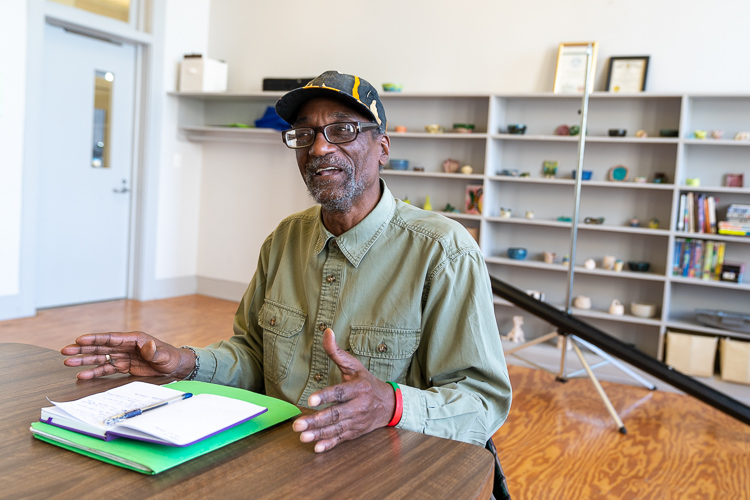
Q: Can you talk a little bit about the kinds of projects you might do where you try and get nonprofit support, foundation support, because Broadmoor was just brilliant in how you guys went about that. Ernest Johnson: Well, we're trying to expand our program here to adjust our programming to see more people to do more things. So some of the things we're trying to do is to expand our programming at the Health and Wellness Center. We're also looking at what is our role in real estate? Now that they're rehabbing some of these houses, I think that our role in real estate will have less of a footprint. At one time Broadmoor had a lot of properties they were managing, and they were doing it fairly well. My belief is that we don't have the same managerial capacity. We're gonna continue the real estate game, we're going to have to find a way with all to hire a management company, I just don't believe we have the same capacity to oversee a large or medium size real estate portfolio like we did. So we're kind of rethinking that. But what comes to mind for me is more intergenerational programs. The seniors have told me on a number of occasions, they don't have things to do during the day, that they would like to do things during the day, particularly when their grandchildren whom they care for, in some cases, are at school. One of the things we're talking about is more intergenerational programs. One of the things that we do bimonthly that will continue to do is Eatmoor, we have vendors come out. That's what our stellar outreach program is, so that we do a lot of community things. We had one program that we call Artmoor where artists came out. We haven't continued it because the process by which the vendors were paid was too laborious, and we got to do a better job with that. So we'd haven't done that. |
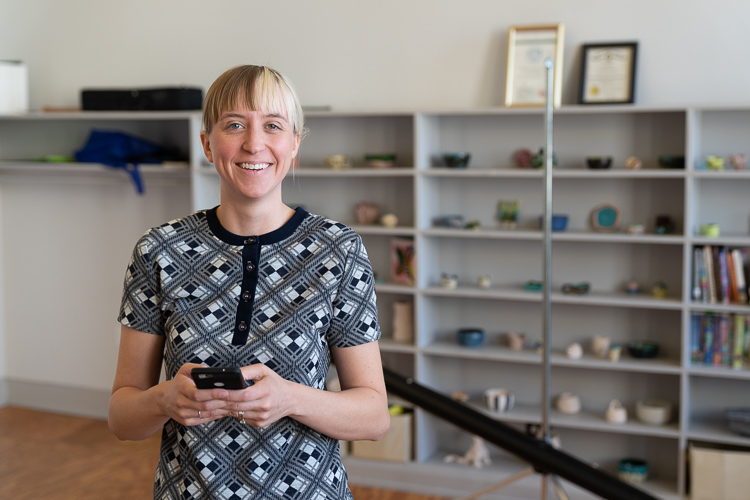
Anna Wanserski
Anna Wanserski: We are bringing in Artmoor. The community center within the library is also operated by the BIA, so we're bringing artists in, next week actually. She's going to display her artwork in the community center. We partner really heavily with the library to do a lot of programming, like Ernest was saying, like senior programming. Then we do snap assistance at the library. We do a lot of programs in conjunction with the library. Right now actually, they're planting seeds for the prairie garden outside the library. So we work really closely with them, and that's one of the programs that we offer is the Artmoor program. We recently got funding for cleanup days, we did a volunteer day last year. So we're going to continue to do that, working with Soul to plant trees, then also Green Light New Orleans, and they do the water barrels. We'll make sure that we can bring in water barrels to residents who might have issues affording that so we can help make sure that they can afford that and provide it for them, then we'll do cleanup of catch basins in the neighborhood. At the last volunteer day that we had we cleaned up 50 catch basins in the neighborhood. We just received funding and we'll continue to do that twice a year. |
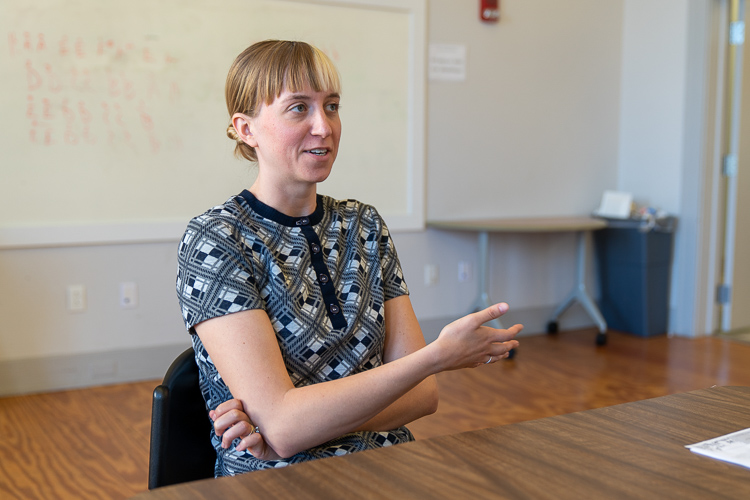
Q: So funding for a thing like, where there is volunteer activity, what is the money used for? Ernest Johnson: I know that we used Artmoor last year just for exposing area artists; there were spoken word artists, musicians, those kind of things. It was a showcase of community talent. I think it raised enough just to cover the cost of the event, but that's largely for exposure. That's how we gain community support. We have a booth there, we have shirts there. The breweries come out, they're very supportive. Because what the breweries do, there's a multiplicity of them, they come out and they give that as an in kind contribution. They get a ticket from us for five hours, then take it they go and get a beer or a brew of their particular choice. So that works well, but it's our community exposure and it gives us an opportunity to talk to residents directly. You have the big lawn, the kids are running around, and that's when you talked about unity, but that's where all the subsections come out. You'll have people from C you'll have people from A, you'll have people from B, it's what I call serendipitous interactions, where they just spontaneously have that. We like that kind of spontaneity with different people. I didn't convince him, but I saw Mayor Landrieu I tried to draft him to run for BIA president, but I had no such luck. |
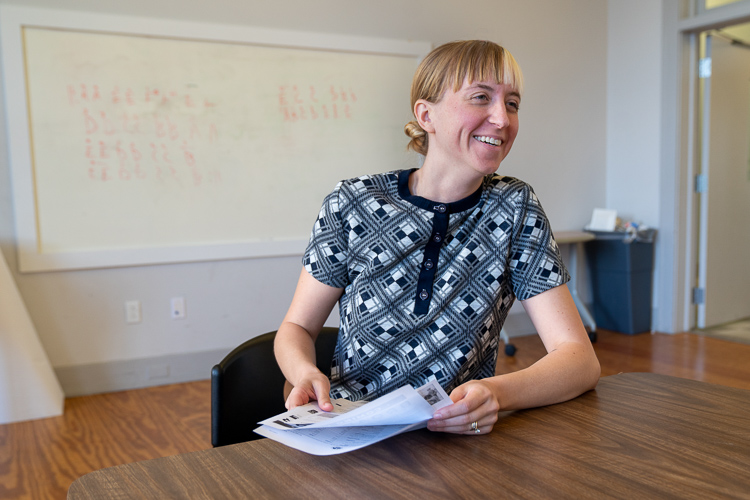
Ann Wanserski: In 2019, we did a community neighborhood assessment survey. We got feedback from 100 different residents and this is kind of a summary of the results from that survey and we presented that at our January meeting. Q: What were some of topics on that survey? Ann Wanserski: These are the main takeaways, so the concerns that the neighborhood had, it was actually really cool to see that 78% of survey respondents believe that Broadmoor is somewhat or very safe, 95% of survey respondents talk to their neighbors, and 79% connect weekly or daily, which is really great to see. 82% believe that it's a good place to raise children. Some of the things that came up were concerns about water management, flood infrastructure defense, which we've had some flooding incidents more recently. So that's been a big topic of concern for neighbors. Creating more neighborhood cohesion, so this kind of talks about ways that the BIA is helping to address these concerns in 2020. So we used to have neighborhood meetings every other month, and now we've moved to doing monthly and we've actually started offering childcare at our meetings, and then we do a dinner as well that's free and available to everyone who comes to the meeting. So those are some of the ways that we're helping to create more neighborhood cohesion, by making our meetings more accessible to everyone and having them more frequently. Then we've actually created topics for all of our meetings for the whole year around the issues that people brought up. So coming up in March, our meeting topic will be affordable housing. That way if you know if you want to come to the meeting, you can decide if it's a topic that interests you, and that would actually pertain to what matters to you and Broadmoor. Ann Wanserski: I think there's always a longing for more cohesion. So I think right now with where the BIA is, it's been in a transition for the last year or so. I think everyone is eager to see that we have this plan in place and we're hearing the concerns of the residents and creating these steps and the stability and the structure to help better address people's concerns and making sure that they do feel still like their voices are heard and we're doing what we can. Obviously we're a nonprofit, we have limited resources, but there are small steps you can take to make sure that people are feeling heard. That's the focus of 2020 right now. We have a new executive director, Sarah Pritchard. She's actually out on maternity leave right now otherwise, she would be here, I'm sure. She's really taken huge steps, she's only been with us for a few months, but she's taken huge steps. So I think this year will be really pivotal for the BIA, and to help make sure that it's functioning the way that it needs to. Because it's not a normal Neighborhood Association by any means. So making sure that people understand that these are services that are helpful for everyone and that it is doing what it's supposed to be doing. Not just the neighborhood meetings, but also offering these accessible wellness services, so we have sliding scale counseling, and we run the food pantry. Services like that you don't normally find with a neighborhood association. Ernest Johnson: We're trying to get more active, thanks to people like Ann, who's actually done a wonderful job who's moving on soon to bigger and more responsibilities, and to our Executive Director, our Director of Program Operations has worked really diligently to move us along, I went to housing rehab we have in our communication efforts, trying to reach more people at the community meetings, we've added food there and we've added through the work of staff daycare for children there to encourage more people to come out. It's the same location where we have a food pantry, we give away thousands of pounds of food each month to area residents and so we see the need because sometimes I'm on the bus coming from work. I work part time as a case manager, when I come up this bus turn then I come up and I see the lines of people in front of church. Which reminds me, so we're trying to increase that, I think it's about 2000/3000 pounds a month of food we gave away so we're trying to increase that to 5000 pounds. So there's a real need again, you have a dichotomy here, some people very affluent who I know I'm going to hit up for a check for photosynthesis and our different fundraising events and some people who are struggling day to day. That's diversity in Broadmoor. |
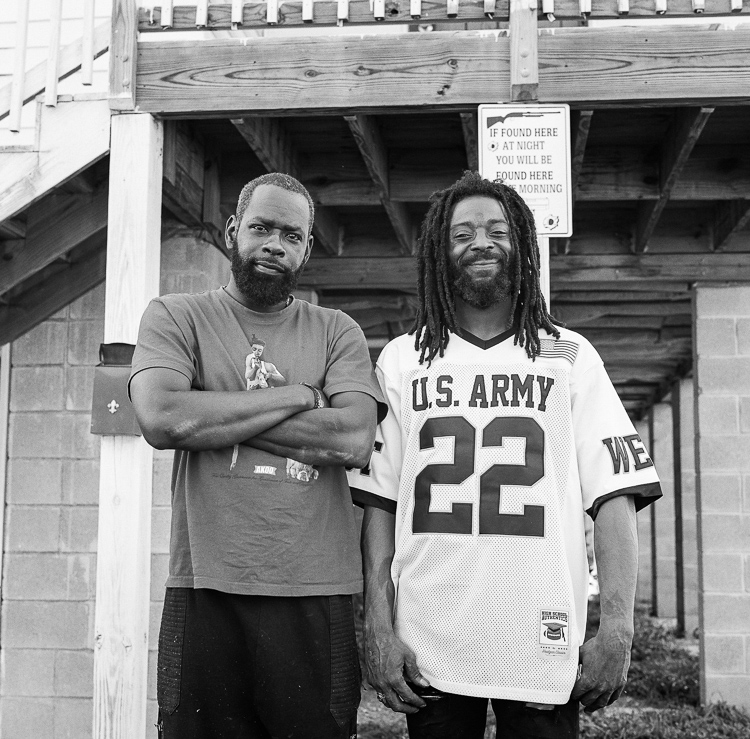
Darrick Holmes and Nolan Alexis
Nolan Alexis: Yeah, I was here my whole life. I had a vision. I was on the roof. Let me know why'd I come. So I'm gonna be on the roof. So the vision told me to fly. So I had a vision, when I flee. I had another vision, it was weaker, but I could feel another storm coming. I told my dad, and that's the only one belief. I went to the book of Daniel and I saw what the four winds of the Earth were, and it was a hurricane. We supposed to take these elements, earth, water, flame, and air which make the spirit of living. That's how we able to breathe the air, we're made from the dust of the earth. He breathed a breath of life in us. He never took a rib from us. He never took from a woman, a woman was made with us. A woman and man fashioned together. And the immaculate conception of the son is all of us. When you say Jesus Christ, you mean all of us. That's the language I'm trying to learn, it's an ancient language called Jeez, that we are aura of gods. When you say Jeez, you mean all of us, Jeez-us, all of us. We make the big picture together. |
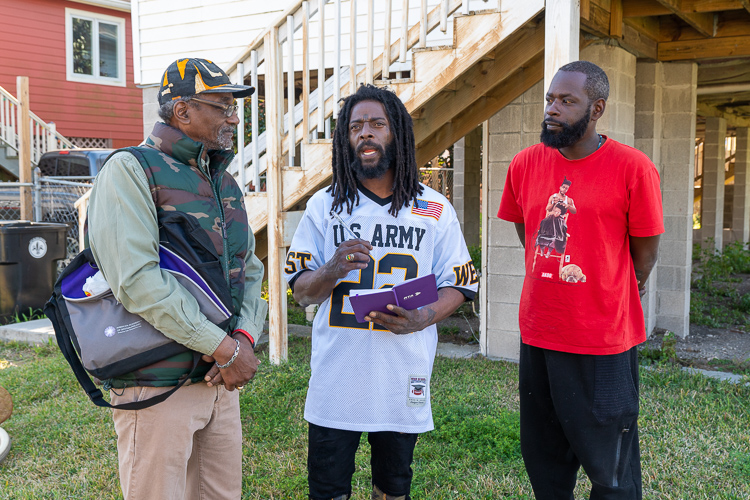
Nolan Alexis: Well, I come from two sets of family. My grandmother side, which is this house right here, they're Cherokee natives of this land. And on my mother's side they're Ethiopians. Q: But if you grew up here, you got the accent? Nolan Alexis: Yeah, my Creole, it comes out. It came out when I was weak. They gave me some medicine, that wasn't a part of me. I cried out in spirit and God gave me Creole. Q: That's fantastic. Nolan Alexis: Yeah, I know I'm the last descendant of my ancestor that talk with Creole from here. |
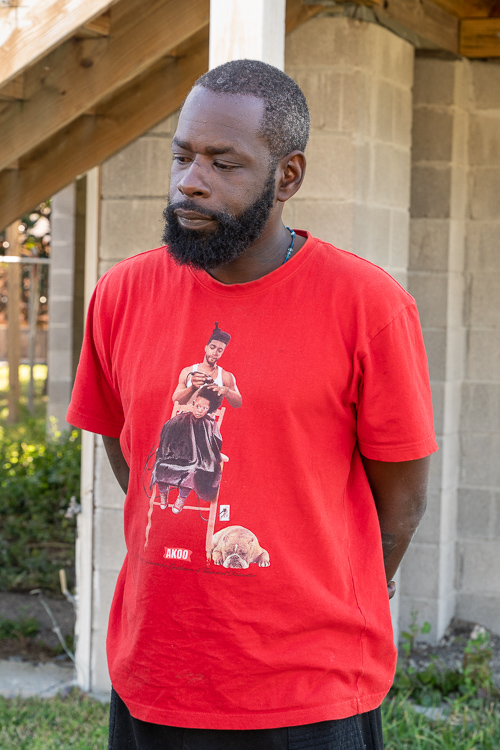
Darrick Holmes
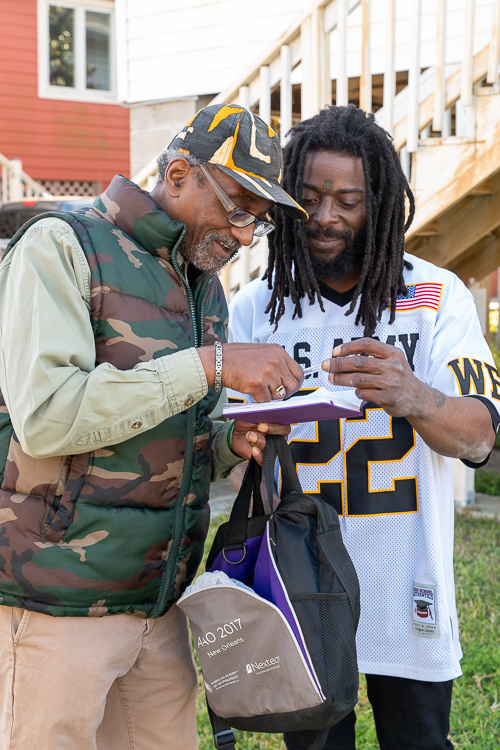
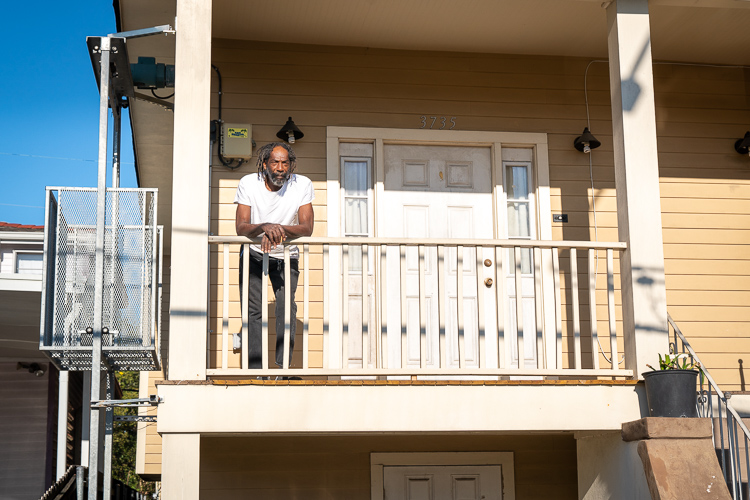
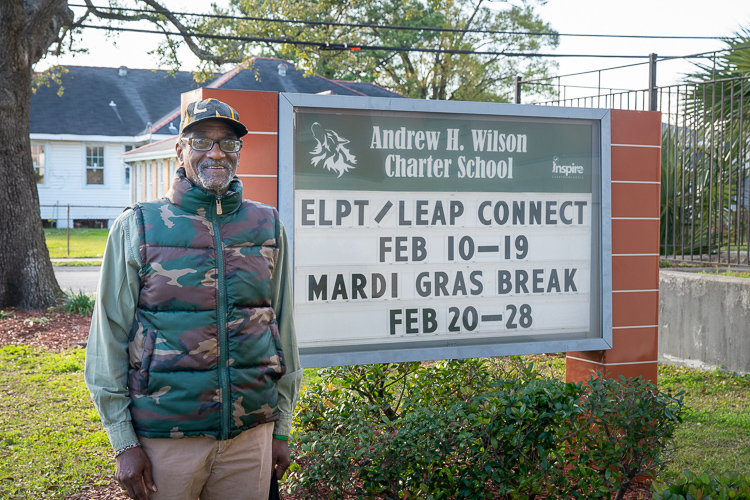
Ernest Johnson: People are very proud of [the Andrew H. Wilson Charter School] because many people believe that the community is known by the schools it keeps. |
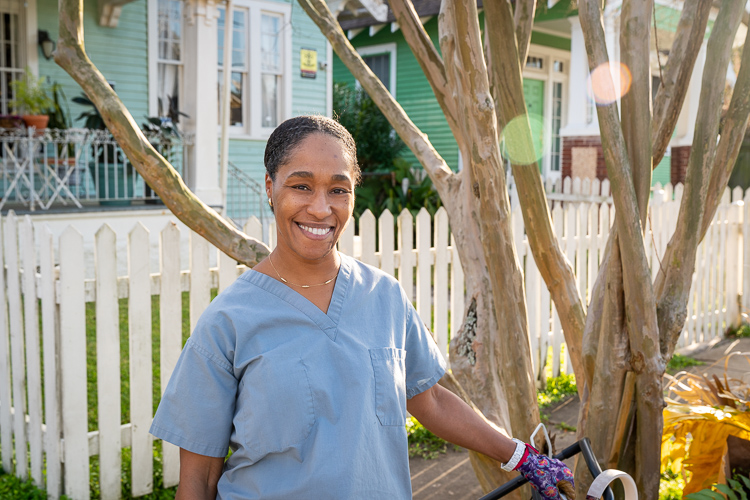
Aliya Magee
Aliya Magee: I originally grew up in Jackson, Mississippi, but I've been in New Orleans since 2002. Q: Just in time. Aliya Magee: Yes, very convenient. Then did my vet school at LSU, and then came back. For me there's no option but to live in New Orleans, which is why I still commute. |

Ernest Johnson: You work for a veterinarian in the area? Aliya Magee: Well no, I actually am on faculty at LSU, but then I have my own consulting business that I do here on the weekend. So I went to work this morning and then it was a perfect day to come and knock out the yard work because the mosquitoes are going to be bad this year. When it warms up, I can come, I can cut the grass, I can go through clear out the weeds. Ernest Johnson: No pools of standing water. Aliya Magee: Yeah, find all my little standing water patches take care of those, get all the dead wet leaves up because I think we did not have a hard winter so I expect that mosquitoes are going to be significant. So that was my plan for today. Get home, take care of nest. |
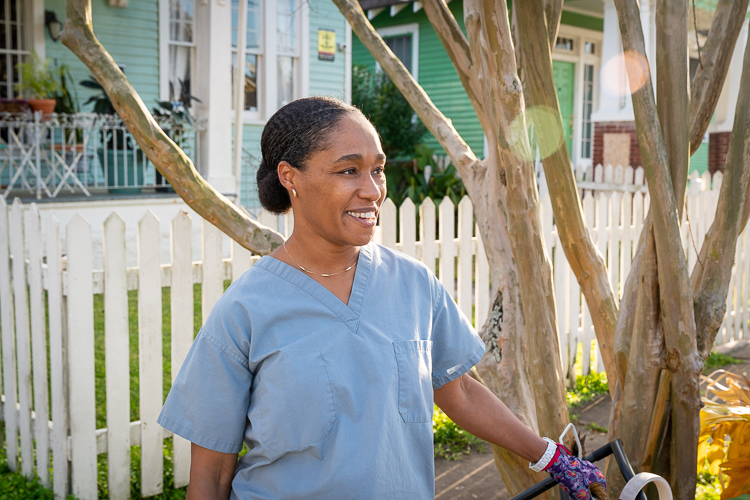
Aliya Magee: One of the things that I really like, is that it's a true neighborhood. You have foot traffic, you have people walking their dogs, sitting on the porch, you know your neighbors typically, and there's not a whole lot of hustle and bustle, which is what I like. And it's Central, so it's been easy to get to I-10. It's very easy to get downtown to CBD. It's easy, you can pop out and go wherever you want. Then you come back and at night you can hear a pin drop in most of the areas. The neighborhood association is one of the strongest ones in the city which gives credit to the fact that Broadmoor's still here as a neighborhood. Q: I worked with them a bunch right after the storm and got to know all the people. Aliya Magee: I absolutely love it and it's just being able to buy in this area and say I will never leave. I'm not get rid of the property ever. Which is why you've got to take care of it. [addressing neighbor] How are you? He's been here forever. So yeah, for me I was looking in the area and then got very fortunate to be able to find a place that was in my budget in this neighborhood. I have not had a second thought. |
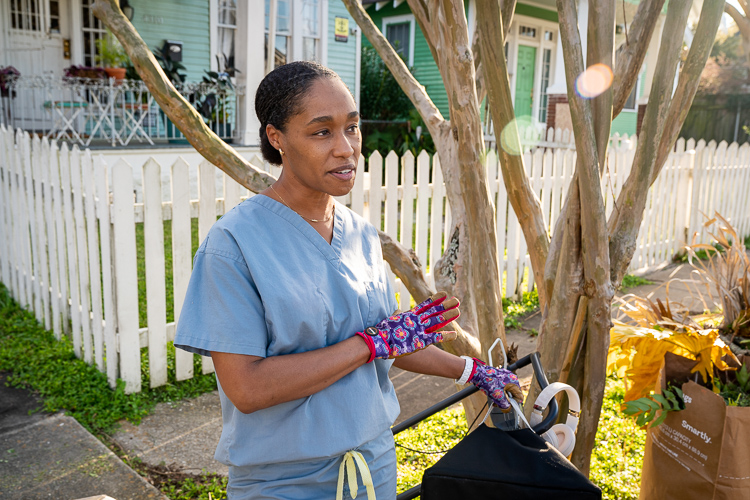
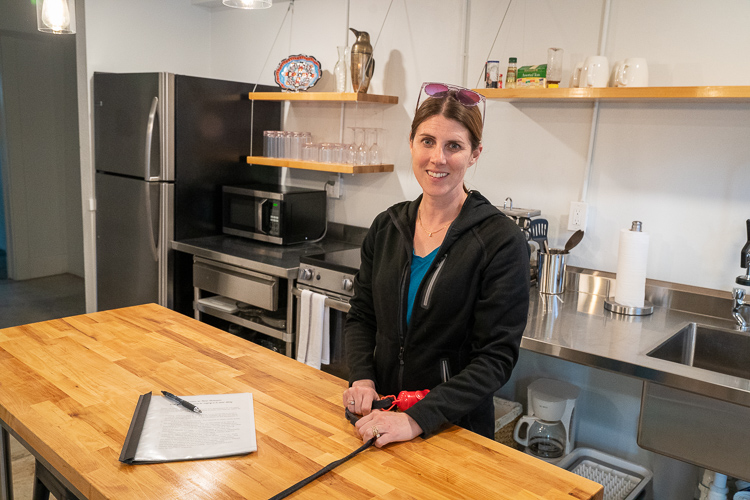
Molly Pastermac
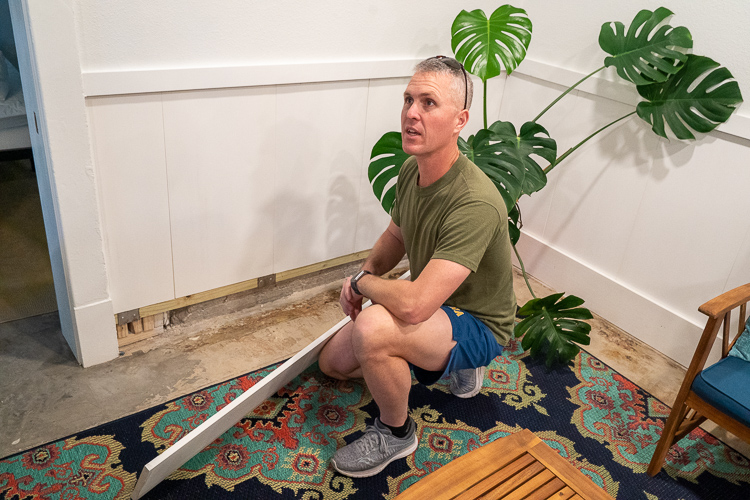
Nick Pastermac: We basically designed a magnetic baseboard, it just comes right off. Then these can basically, I gotta try to get something underneath it to catch it and get it off, but it's just plastic walls that are corrugated, so that we can pull that off and then just get the dehumidifiers and the fans going in here. If we have to wipe it down with bleach water, anything we can, and then just pop them, they slide up underneath this thing once it's fixed here. |
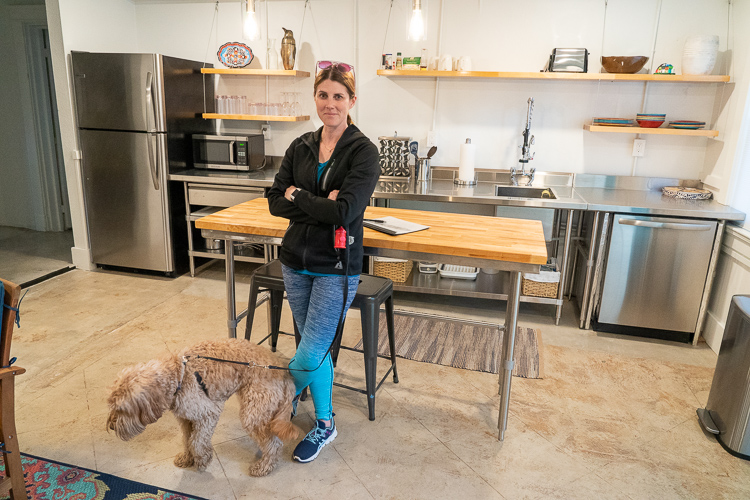
Nick Pastermac: We basically just left the floors concrete and instead of redoing wood cabinets, we put on all the stainless steel so that everything's kind of air and exposed. So if it floods we just clean it out. The only thing that we might lose would be a dishwasher, the range, a refrigerator because we couldn't really lift those up off the ground. |
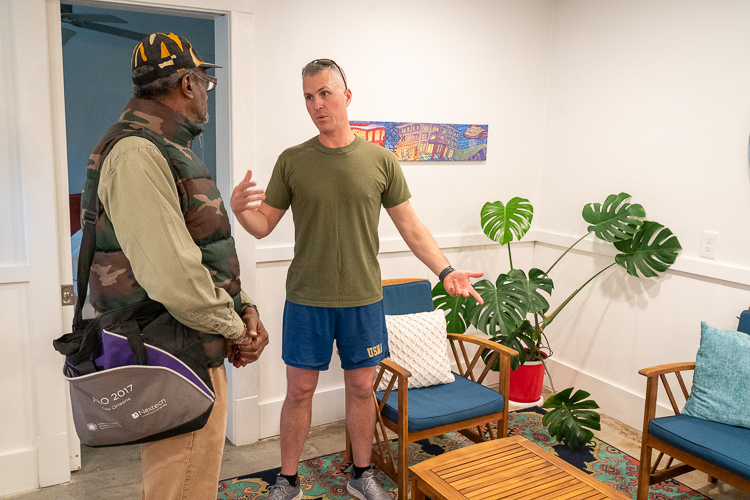
Nick Pastermac: Yeah we had to tear it all down, redo it all. |
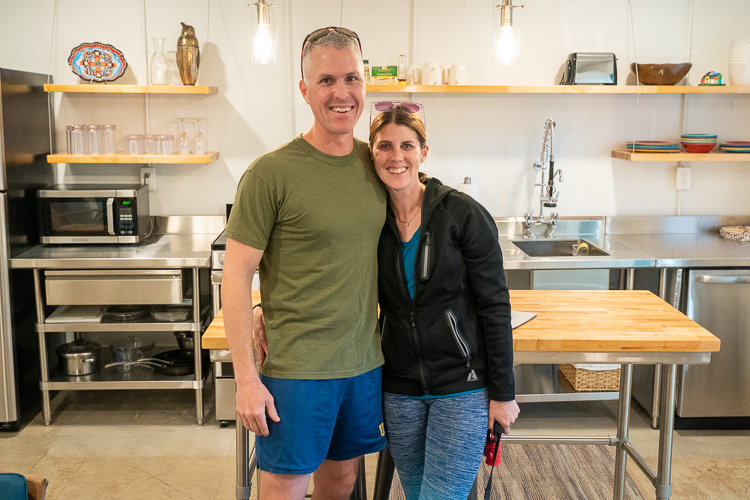
Molly Pastermac: Yeah, we’ve been here for 20 years. We took about two and a half years to open a chocolate business in the Quarter. Nick Pastermac: That’s why we moved here was to open one up in the French Quarter. It’s doing very well, we’re on Decatur street in the Jaz Brewery building if you guys ever go down there well be happy to buy you ice cream. |

The Pastermac Family
Nick Pastermac: You can just look up Kilwins too. If you look up what's on that card you'll find it. We still have one of these businesses in Annapolis, Maryland. That's where I moved from and we used to have photo journalists come in often to photograph our work, the stuff we would make, the different products or different things. So anyway, it was always interesting and they came mostly from Fort Mead, they were military photojournalists, learning how to basically tell stories through photography, but probably about once a month we'd get an email from one of them saying, can I have permission to come in your store and get in your kitchen and take photos of you guys dipping the chocolate stuff and making everything and so we're used to this kind of thing. Q: Are you in the shop on the Sundays? Molly Pastermac: Our partners will probably be in on Sunday. They're always making, always cooking on the marble slabs and stuff like that. Dipping apples or making pralines. It's a very old fashioned sweet shop. |
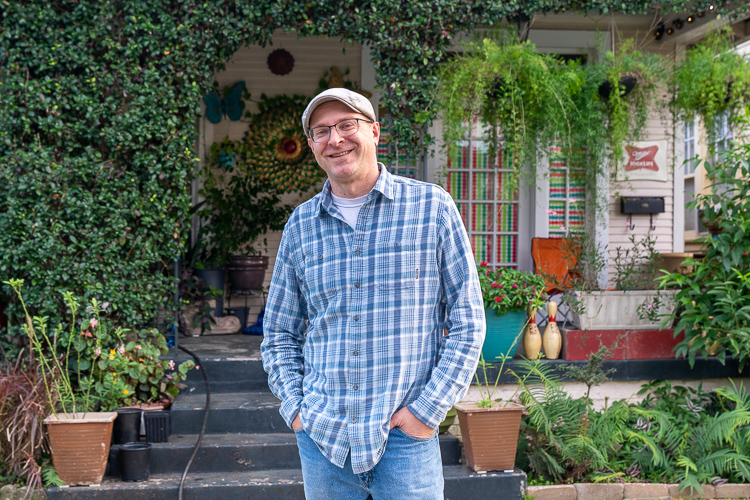
Will Bezubic
Ernest Johnson: The music in this town is just phenomenal. Will Bezubic: I've heard people say this city music wise we go toe to toe with LA, New York, Austin. That's one of my favorite things just about living here is the number of festivals. Most of them are free, is it the square, Creole gumbo fest. |
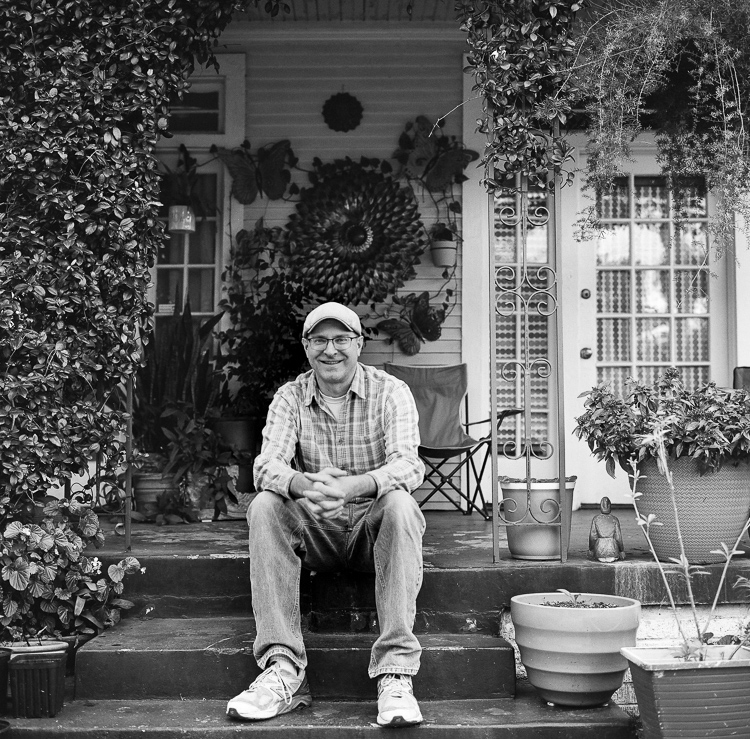
Q: Did you come here to do video stuff? Will Bezubic: For shiggles, for shits and giggles man. I was at the end of a full time job up in Memphis, that's where I moved down from. I was on contract and my contract was up and didn't know what I was going to do next. I was just talking with a friend of mine, and he was like, you'd love New Orleans. I cook too, so great food scene, knows I love music. It's a great music scene. And 10 or 9 years ago, Hollywood South was in full effect and he was a grip in the stagehand union, so he knew about that. When I first moved here, I actually did some stuff on movie sets, like behind the scenes shooting. I wasn't actually on crews, but just kind of would walk on for a few days during production and do some interviews and shoot behind the scenes and it was really cool, for a few years I did that. I got to live the Hollywood dream for a bit. The best part about it was the food, the catering. They eat so well on movie sets. It's unbelievable. I miss that the most. Q: When you were looking was Broadmoor on your radar? Will Bezubic: Absolutely. This neighborhood is really different than a lot of New Orleans. At least from my experience. For one thing, this is something you don't see in a lot of neighborhoods, lawns. A lot of places, the place I had off of Freret Street, the stairs literally went down right onto the sidewalk. I think because it's a geographically confined area, New Orleans, people have tried to get a lot of bang for their buck out of the real estate that's there. So that's why they do like the long narrow buildings right up to the sidewalk and this was one of the last neighborhoods in New Orleans proper to get developed. It was a swamp. This is one of the lowest points in the city. Ernest Johnson: Broadmoor is a big swamp area. Will Bezubic: Yeah, this used to connect to Bayou Saint John, there's a waterway that went through here, you could actually from this neighborhood get up to Lake Pontchartrain. You feel like you got a little elbow room in Broadmoor, the houses aren't zero lot line over there too, like in between me and my neighbor's place there was just wide enough to get my bicycle down, like the handlebars would like rub off if you weren't paying attention, trying to get up the little alley. The places are bigger, too. There's a lot of big homes in this neighborhood. And just because it's not the Bywater, it's not the Marigny, it's not the Garden District, it's not boujee or really ritzy, it's reasonable to live in this neighborhood. It's not expensive. By other city standards, I think it is, but for New Orleans, it's fairly priced. I've got a huge place in it and it doesn't cost me an arm and a leg. |
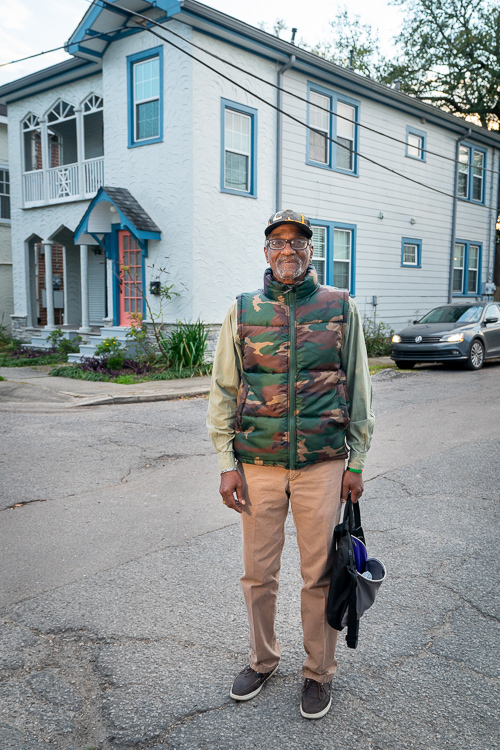
Ernest Johnson, in front of his house
Q: I have to say that you guys are just amazing Ernest Johnson: Well, we don't pat ourselves on the back. The troubles we do have is continuous community involvement, with trying to get the committee's up. We have a depletion of board members because of the rotation and trying to get better representation as it relates to women and other peoples of color. Trying to keep the equity in terms of opportunities for everyone. Trying to keep the door open here in the center to meet all obligations through money because a large portion of our budget is contingent on parcel fees. We've had to be more scrappier about that. Some of the commitments we've had economically from people that owe us an entity is oh, it hasn't come so fast. It's nice to hear the accolades and we love it. But we know that we have a lot more work to do, we work diligently to build our own capacity and infrastructure as a full time staff, maybe two people a part time staff, we've been very fortunate that things have worked out henceforth the way it has. I feel a lot better because we have a process of recruiting the board members, using our expertise better, getting some of these projects done with housing, which is a big relief. How could you be an improvement association when you have three properties that are dilapidated? It's a dichotomy from behavior to what we're saying. So we're working on that capacity, it took us a while to get an Executive Director in place. We had a series of misfires on that, we finally got somebody there, fortunately for us, and she's on maternity leave now. So we're really pleased about that, again, getting some new board members who seem very committed to helping us. Trying to identify people who can help us raise funds and has relationships in the philanthropic community so we're not dependent on grants. We're going more aggressively at grants. All with community input. Again, we've done surveys, we're working with interns to get community feedback. We set up at the library on occasion here to get community feedback. We use that feedback to drive what it is we're doing within the framework that we're set up and established for. Because we are a special subsection or business improvement district. Under the Broadmoor Improvement Association, there's a Broadmoor Improvement District which was a legislatively created district. The parcel fee going to the Broadmoor Improvement District was a pass-through going to the Broadmoor Improvement Association. The other day I signed some checks and I'm like, the bookkeeper explained it to me, but I still don't quite have it, maybe I that's why I'm not a bookkeeper. We're working hard to just try to improve our capacities with resources and functionality. This is the first time we've actually had a communications person, that role was previously done through an AmeriCorps person, we kind of rethink a better use of that. The resources that we're using to fuel the AmeriCorps, was that good, because I didn't like the transition. When a person filled up the capacity and the ability to do the job and they really got into it, they're gone. So we needed something more consistent in communications and it opened up our eyes that we need a more formidable communication arm to get our message out. So we've done that. Just always looking to align our resources. That's why I like working with the board and the community. We're always open to ideas about how best to go. We're hopeful that we'll get the approval for the parcel fees again, it's going to be another ballot referendum. |
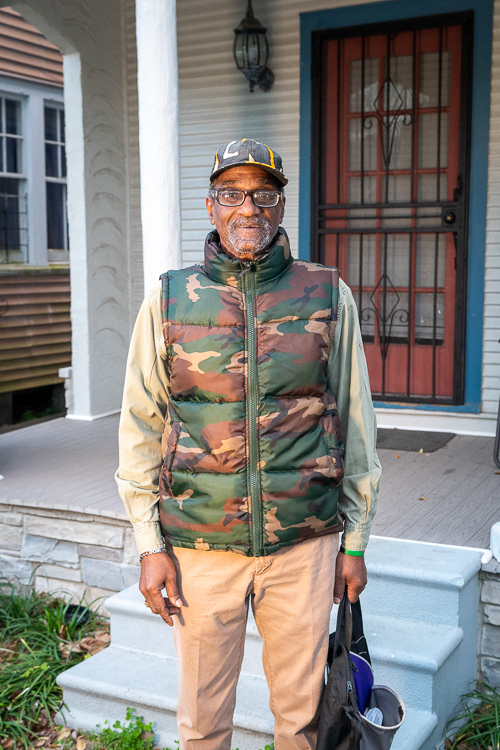
![]()
Note. These photo portraits cannot represent the whole range of views in a neighborhood. My survey research tries to do that (see my home page). But I think that these photo portraits express views that are widespread in a neighborhood. This is due to the methodology. Qualitative work like these photo pages has more depth, while quantitative work like surveys has more breadth. Both are valuable, and if you want to know more about a neighborhood, you should try to learn about both. |
![]()
All materials which I created, including animations,
are Copyright © 1998-2020 by Frederick Weil; all rights reserved.
Main page: www.rickweil.com